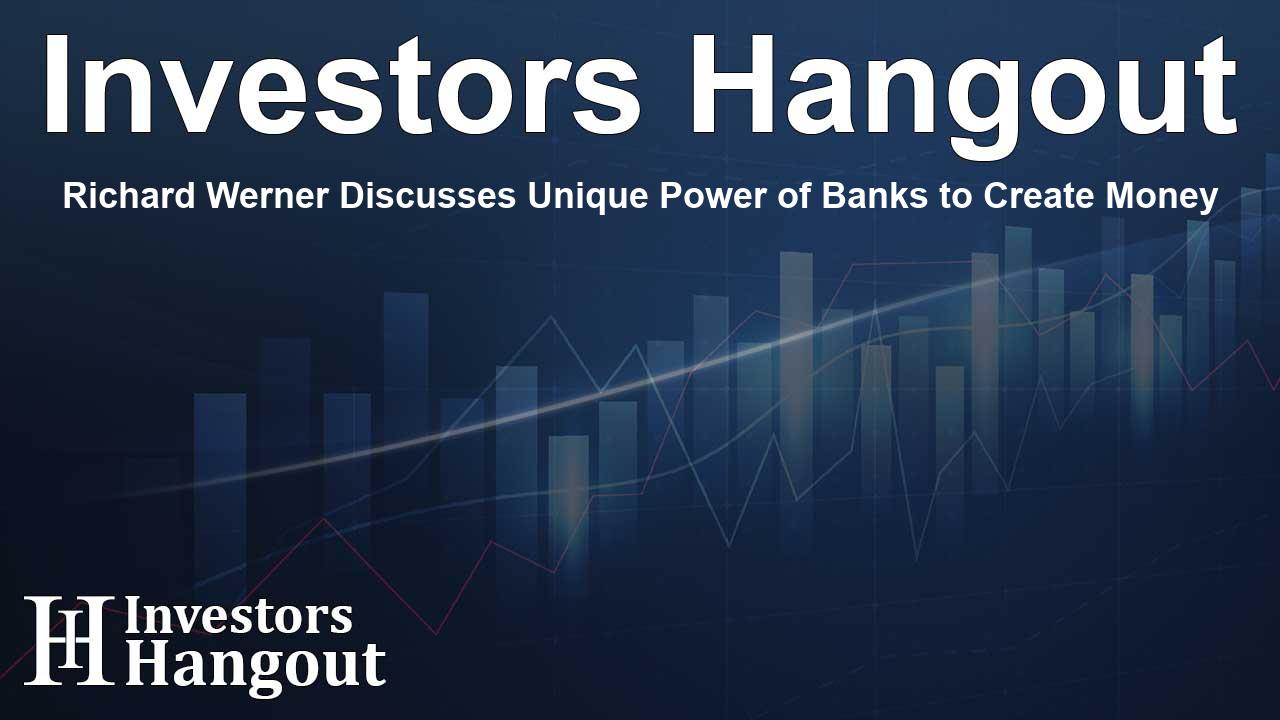Richard Werner Discusses Unique Power of Banks to Create Money

Scholarly Insights on Banking Dynamics
Renowned economist Richard Werner challenges the conventional view of banks as merely intermediaries in financial transactions. He asserts that these institutions play a crucial role in the economic landscape, one that textbooks tend to overlook. Werner emphasizes that banks possess the exceptional capability to create money, a power that significantly impacts the dynamics of credit and the overall economy.
Understanding Banking Theories
Three Main Theories of Banking
In discussing banking, Werner introduces three primary theories that elucidate the complex role of banks. The first is the “intermediation theory,” suggesting that banks primarily serve to gather deposits and extend loans based on those deposits. The second, termed the “fractional-reserve theory,” illustrates how banks retain a fraction of deposits as reserves while lending the rest. Finally, the “credit-creation theory” proposes that banks generate money through the process of booking loans, essentially creating new capital.
Critique of Macroeconomics
Werner critiques the field of macroeconomics, stating it has struggled significantly due to a persistent exclusion of banks from economic models. He reflects on historical perspectives, noting that proponents of credit creation have often been dismissed as outsiders or 'cranks' by traditional economists. This gap in understanding serves as a major reason why many economic predictions fail to capture pivotal shifts in the financial landscape.
The Current Economic Climate
The importance of understanding banking systems comes to light amid a declining demand for credit and tightened lending standards. Recent surveys, such as those conducted by the Federal Reserve, indicate a significant decrease in small business loan applications, which is critical for economic growth. As businesses face stiffer lending requirements, the implications on cash flow and investment strategies loom large.
Analysts' Perspectives
Various analysts, including those from major financial firms, foresee potential monetary policy adjustments. Expectations are rising for potential interest rate cuts as economic indicators suggest a slower growth trajectory. Notably, recent job growth figures have prompted discussions among economic leaders regarding necessary adjustments to support a healthier economic environment.
Implications of Banking's Unique Role
As the Federal Reserve navigates an economic landscape characterized by growth rates below potential and persistent inflation, Werner posits that acknowledging the money-creation function of banks could provide clarity on numerous economic puzzles. This understanding is crucial not only for policymakers but also for business leaders looking to navigate the intricacies of funding and investments in a tight credit market.
Conclusion: Rethinking Banking in Economic Discussions
Werner's insights encourage a re-evaluation of the banking sector's role in the economy. Moving beyond the outdated perceptions of banks merely as intermediaries could enhance discussions around fiscal policy and economic growth, recognizing the profound capacity these institutions have in shaping financial realities.
Frequently Asked Questions
What is Richard Werner's main argument about banks?
Richard Werner argues that banks possess the unique power to create money, which goes beyond merely serving as intermediaries.
How many theories of banking does Werner discuss?
Werner outlines three primary theories: intermediation theory, fractional-reserve theory, and credit-creation theory.
What does Werner believe is missing in mainstream economics?
He suggests mainstream economics has ignored the role of banks, leading to significant gaps in economic models.
What recent trends are affecting credit demand?
Recent surveys indicate a drop in small-business loan requests, showing tightening lending conditions amidst economic uncertainty.
Why is understanding banks' roles pivotal for the economy?
Understanding how banks create money could elucidate many economic challenges and inform better policy decisions.
About The Author
Contact Olivia Taylor privately here. Or send an email with ATTN: Olivia Taylor as the subject to contact@investorshangout.com.
About Investors Hangout
Investors Hangout is a leading online stock forum for financial discussion and learning, offering a wide range of free tools and resources. It draws in traders of all levels, who exchange market knowledge, investigate trading tactics, and keep an eye on industry developments in real time. Featuring financial articles, stock message boards, quotes, charts, company profiles, and live news updates. Through cooperative learning and a wealth of informational resources, it helps users from novices creating their first portfolios to experts honing their techniques. Join Investors Hangout today: https://investorshangout.com/
The content of this article is based on factual, publicly available information and does not represent legal, financial, or investment advice. Investors Hangout does not offer financial advice, and the author is not a licensed financial advisor. Consult a qualified advisor before making any financial or investment decisions based on this article. This article should not be considered advice to purchase, sell, or hold any securities or other investments. If any of the material provided here is inaccurate, please contact us for corrections.
